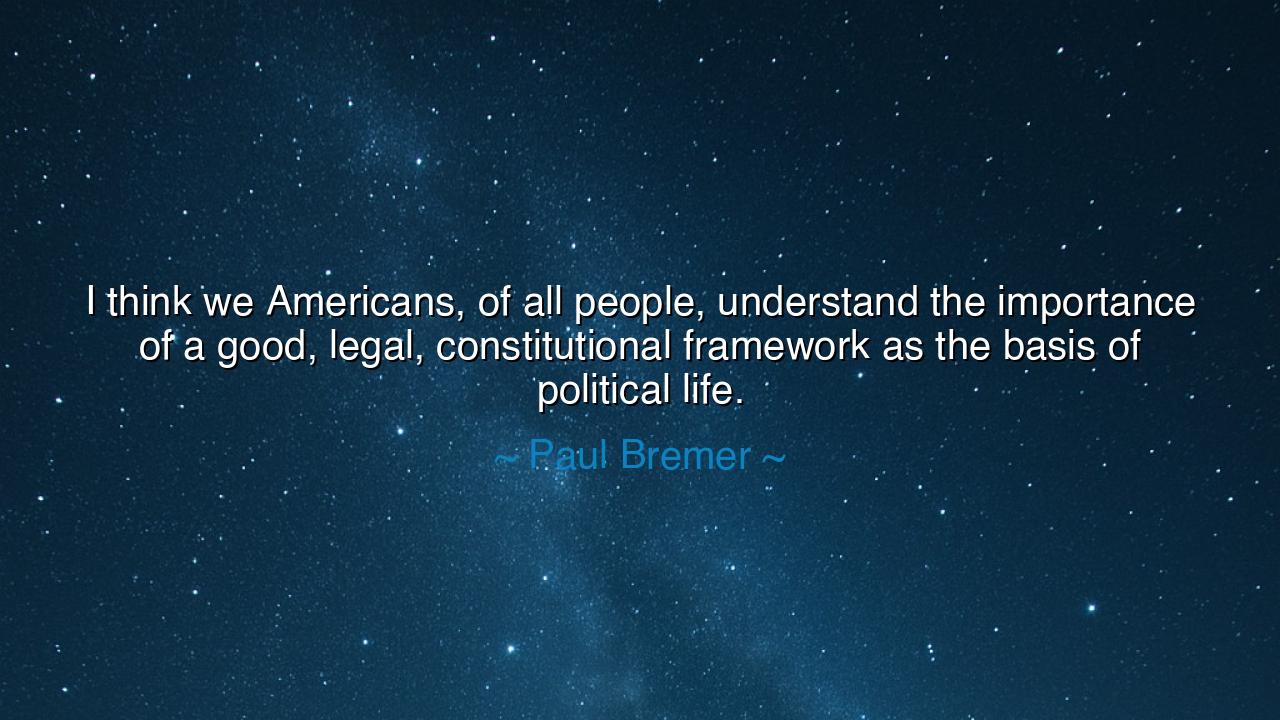
I think we Americans, of all people, understand the importance of
I think we Americans, of all people, understand the importance of a good, legal, constitutional framework as the basis of political life.






In the words of Paul Bremer: “I think we Americans, of all people, understand the importance of a good, legal, constitutional framework as the basis of political life.” These words, though spoken in our own time, reach back through the corridors of history to the very founding of nations. They remind us that freedom does not endure by passion alone, nor by might of arms, but by the careful weaving of law, structure, and principle. Without such a framework, liberty is like a flame in the wind—bright for a moment, but easily extinguished.
The ancients knew this truth. Plato spoke of the “ship of state,” warning that without laws, the vessel of society would drift aimlessly, at the mercy of storms. The Constitution, in the American experiment, became the rudder and the keel, guiding a people once bound by tyranny into a new order of self-rule. Bremer’s words echo this heritage, reminding us that the strength of political life rests not on the whims of rulers, nor the tides of public opinion, but upon the enduring pillars of a legal framework.
Consider the tale of the United States at its birth. The Revolution won independence, but independence without structure soon gave way to chaos under the Articles of Confederation. States quarreled, debts mounted, and the dream of unity faltered. It was only with the drafting of the Constitution in 1787, and the creation of a framework of checks and balances, that the republic found stability. This moment in history embodies Bremer’s insight: that passion for freedom must be tempered by law, and law must be grounded in principle, if liberty is to endure.
The meaning of the quote also speaks beyond America, to all nations that struggle with governance. Bremer himself, as a diplomat in foreign lands, saw the collapse of societies where constitutional order was absent or fragile. Without a legal foundation, leaders become despots, factions wage war, and the people suffer. A constitution is more than parchment; it is a covenant, binding generations to rules higher than ambition, ensuring that power is always answerable to principle.
History gives us cautionary tales. The French Revolution began with cries for liberty, but without a stable framework, it descended into terror and bloodshed, until Napoleon seized power. The dream of freedom gave way to the rule of the sword. Contrast this with the American founding, where even in times of trial—the Civil War, the Great Depression, the Civil Rights struggle—the constitutional framework held fast, guiding the nation back from the brink. Bremer’s words remind us that this is not by accident, but by design.
The lesson is clear: without law, liberty becomes license; without structure, freedom dissolves into anarchy. The constitutional framework is not a cage but a foundation, not a restriction but a safeguard. It ensures that the rights of the weak are preserved against the will of the strong, and that leaders serve not themselves but the people. For Americans to understand this, as Bremer declares, is to honor the wisdom of their forebears and to recognize their duty to uphold it.
So let this teaching endure: cherish the Constitution, not as a relic, but as a living covenant. In your daily life, respect the rule of law, defend the rights of others, and demand that leaders remain bound to the framework that protects liberty. Do not be swayed by the temptation of short-term gain that undermines long-term stability. For as the ancients taught, a city without laws is a city without soul. And remember: the greatness of America, and of any nation, lies not in its wealth or its armies, but in its fidelity to a legal, constitutional framework that secures justice for all.






AAdministratorAdministrator
Welcome, honored guests. Please leave a comment, we will respond soon